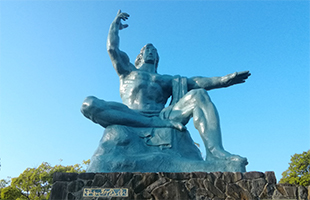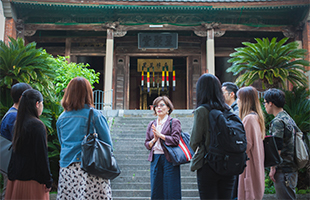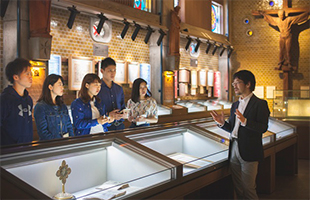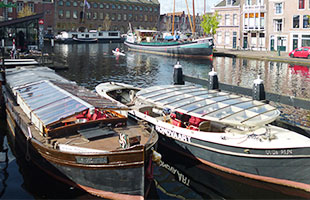Education
Educational Outline
Educational Policy
One of the distinguishing features of undergraduate education introduced by the SGHSS is the organization of its system of education into Modules (i.e., a collection of subjects organized according to their common educational goal).
The SGHSS is organized into the following four programs: the Global Society Program, the Social Dynamics Program, the Culture and Communication Program, and the Dutch Studies Program. These four programs combine several educational modules into a coherent framework in line with the broader educational goals of the SGHSS that emphasize an interdisciplinary and glocal-oriented approach to education.
General Education – First and Second Year
General Education Modules are groups of subjects carefully selected according to a common theme appropriate for liberal arts education at an introductory level. These subjects aim to provide students with general and fundamental knowledge and skills.
First-year education involves the Transition Program, the General Education Module, the Fieldwork Module, Language Subjects and Other Subjects.
Second-year education involves the three Foundation Modules (the Mechanisms of Global Society Module, the Social and Cultural Interactions Module, the Language and Culture Module), the Fieldwork Module, the English Language Module, the Chinese and Dutch Language Modules, and Study Abroad. The three Foundation Modules serve as an introduction to education in students’ major subject areas. These Modules are incorporated into four programs (the Global Society Program, the Social Dynamics Program, the Culture and Communication Program, and the Dutch Studies Program) that will continue with specialized education in students’ third and fourth years.
General Education Module
The General Education Module is mandatory for all first-year students. In the spring semester, students will get a sense of what a global career encompasses through the introductory subject titled ‘Door to Global Careers.’ This will be followed in the autumn semester by five subjects that introduce students to the concept of Glocalization through the lens of Nagasaki.
Foundation Modules
The three Foundation Modules are the Mechanisms of Global Society Module, the Social and Cultural Interactions Module, and the Language and Culture Module. Students are required to take all the classes offered in the Foundation Module of the program they are pursuing and, depending on their program, are also required to take 3 classes in another Program’s Foundation Module (i.e., presented as Supplementary Modules). The subjects in the Foundation Modules have been designed to offer an introduction to the students’ chosen area of specialization, which they will learn about in much greater depth in their third and fourth years. The subjects offered in each Module are listed on the pages describing individual programs.
Fieldwork Module
The Fieldwork Module consists of seven subjects (two of which are compulsory) designed to develop students’ research skills. This Module is specifically designed to teach students the basic principles of research design and practice, which includes how to compose a research question, how to select the appropriate research methodology, how to collect and analyze data, how to write a research report and how to disseminate their findings. Students are required to take at least four subjects in the Fieldwork Module over the course of their first two years of study.
In the final stage of the Fieldwork Module, students will have the chance to take part in an Overseas Fieldwork Practicum in an Asian or African country. This Practicum is designed to give students the opportunity to gain experience carrying out research-related tasks in the field.
The Transitional Phase
The School of Global Humanities and Social Sciences recognizes that the freshmen year is a critical time for students, as many will be making the life-changing transition from high school student to university student. Thus, in addition to creating social support systems to help freshmen, the SGHSS has created an introductory phase of study called the Transitional Phase. Providing the foundation for students’ subsequent studies, the Transitional Phase is specifically designed to improve the English language skills of newly enrolled students. Taking place in the students’ first semester (i.e., the spring semester), the Transitional Phase represents a period of intensive English study designed to help students reach a minimum score of 500 on the TOEFL PBT (or equivalent). Students who have already exceeded this level at the time of admission will be exempt from taking Transition Phase classes in the first semester and will instead participate in other programs to further their language skills and gain practical experience. Such programs include international volunteer work and the internship fieldwork program.
Specialized Education in Third and Fourth Year
In their third and fourth year of study, SGHSS students will be involved in many different types of activities depending on the program they are pursuing. As shown below, these activities range from studying abroad, participating in internships and/or fieldwork, taking Modular classes (in their Advanced Module, Supplementary Modules, and the Language Modules) to ultimately producing a graduation thesis.
Each Advanced Module offers a group of subjects that have been carefully selected according to one of the following program themes: Global Studies, Social Dynamics, Culture and Communication, and Dutch Studies. Building on students’ first- and second-year studies, the Advanced Modules provide students with specialized study corresponding to the themes given above. Accordingly, the Advanced Modules are further organized into the four programs of the SGHSS: the Global Society Program, the Social Dynamics Program, the Culture and Communication Program, and the Dutch Studies Program. Students are required to take classes offered in the Advanced Module of the program they are pursuing and, depending on their program, are also required to take a number of elective classes corresponding to other Programs’ Advanced Modules (i.e., presented as Supplementary Modules). By integrating individual subjects into modules, and modules into programs, the SGHSS is adopting an interdisciplinary approach to achieve the goals of its curriculum.







